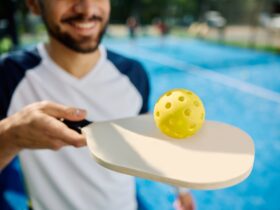Pickleball is a fast-paced and exhilarating sport that combines elements from tennis, badminton, and table tennis.
For enthusiasts and newcomers alike, keeping score in pickleball can sometimes be as challenging as the game itself.
In this comprehensive guide, you will learn different techniques and strategies to effortlessly remember scores during your next match. Let’s dive into these helpful tips and take your memory skills to the next level!
Understanding the Unique Scoring System
While the scoring system for pickleball may initially seem complex, with practice, it quickly becomes second nature.
Unlike traditional sports such as tennis or volleyball, pickleball utilizes a specific point structure that requires both focus and mental acuity.
Revisiting the Basics
To begin, understanding the fundamental rules of scoring will make remembering your scores easier:
In pickleball, only the serving team can score points.
If your team wins a rally while serving, add one point to your score. Conversely, when receiving, teams simply strive to regain control of the serve rather than earn points.
Points are scored to a maximum of 11, requiring a two-point margin for victory.
Competitive tournaments often play to 15 or 21 points with similar win margins. Additionally, games typically use a double bounce rule, where serves and returns must be permitted to land on the ground before striking the ball.
Navigating the Position Numbers: 1 or 2
The server’s position plays a vital role in pickleball scoring. When announcing the score, after stating their current point total, servers call out either a “1” or “2”.
This number indicates which player of the serving team is currently responsible for the ball, rather than their partner. In essence, the “1” or “2” reveals who began serving for that side during each new rotation.
Also read : Pickleball Score Keeper : a necessity to play ?
Strategies to streamline your scorekeeping
Now you are familiar with pickleball’s scoring system, let’s shift focus towards optimizing your memory when recalling scores.
These techniques will ensure keeping track of your victory progress is as seamless as your gameplay.
Use Mental Anchors
Mental anchors are effective tools used in various disciplines and sports when developing memorization skills. When you start a pickleball match, find specific aspects from your surroundings to associate scores and positional changes.
Utilizing objects or situations occurring around you can help establish links between team actions and numerical values.
For example, connecting the sound of a nearby bus horn to a server number switch could remind you every time you hear that noise to register the changing score more effectively.
Visualize the numbers
A powerful mnemonic technique that works exceptionally well in remembering numbers is the visualization method. Try to imagine the digits either written on the ball or placed strategically on the court.
Engaging this visual tool whenever points change can enhance your capacity to remember the present score and minimize mental lapses.
Through repetition and concentration, visualizing becomes an automatic response embedded within your competitive mindset.
Maintain a conversational rhythm
Consistency and rhythm play essential roles in successful score recollection. Just like repeating a song lyric or phrase, maintaining a conversational tone throughout your match translates to heightened memory retention.
Before every serve, announce the score aloud and listen carefully to your opponent’s announcements, too.
By actively engaging in this communication loop, players become conditioned to expect and process score updates at precise intervals, reducing the chances of confusion.
Avoiding Common Mistakes
Even experienced players can fall prey to common errors that jeopardize scorekeeping accuracy. Addressing these pitfalls beforehand helps preserve concentration and gamesmanship during critical moments within a match.
Don’t Rely Solely on Your Partner
While teamwork is undoubtedly indispensable in doubles pickleball, relying solely on your partner for score tracking creates unnecessary vulnerabilities.
As both teammates call position numbers when serving, maintaining an independent awareness of current scores prevents misunderstandings or uncertainties from arising at crucial points in the contest.
Mitigating Distractions
A bustling sports environment offers countless distractions that test even the most focused player’s concentration.
By developing robust mental habits and embracing techniques such as visualization or conversational cadence, you will diminish the impact of external disruptions on your gameplay and memory strength.
Utilizing Learning Aids
Aside from practicing these valuable tips regularly, several resources can help enhance your pickleball intelligence and ultimately benefit your scorekeeping abilities. Among these tools, some standout options include:
- Pickleball guidebooks: Pickleball-specific reading material often covers scoring rules, strategies, and practice routines for honing your remembering skills.
- YouTube tutorials: Visual learners can explore reputable channels offering breakdowns, interviews, and other helpful content curated by knowledgeable professionals.
- Local community meetups: Hitting the court with passionate enthusiasts allows for shared advice, commiserative discussions, and opportunities to observe different styles of score management firsthand.
Taking advantage of available resources complements your dedication to mastering pickleball scoreboard retention, setting you up for success and enjoyment every time you step onto the court.







